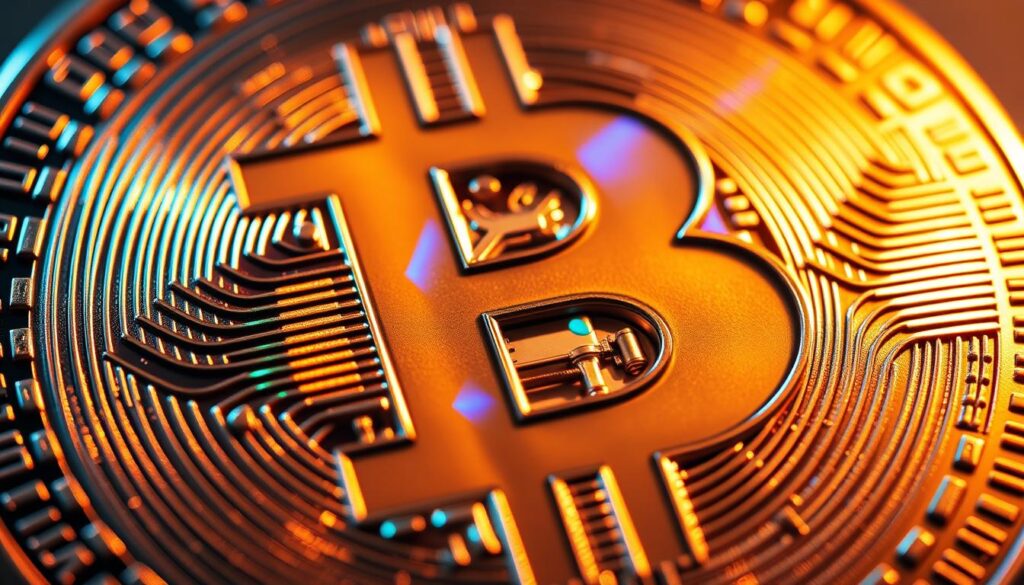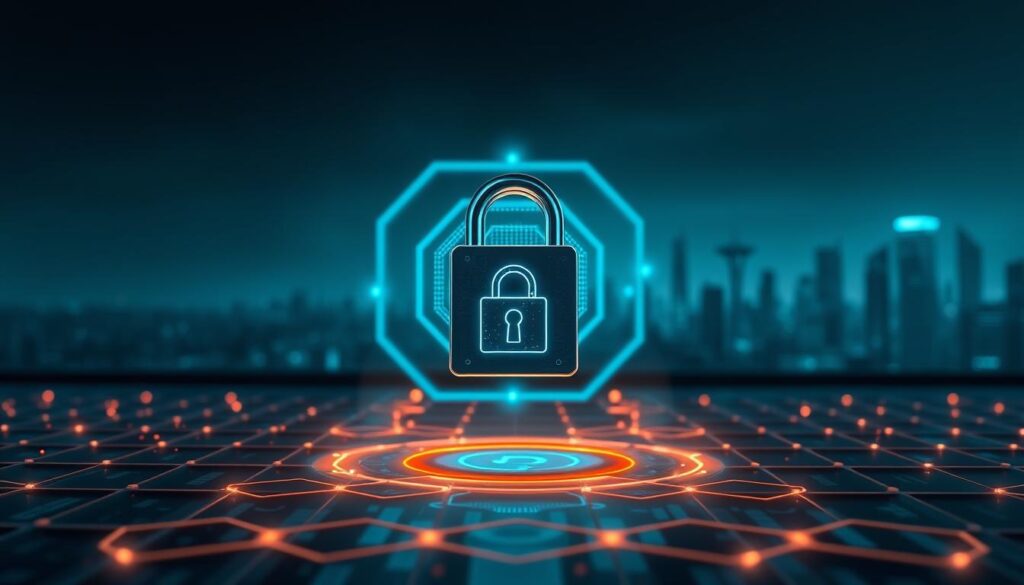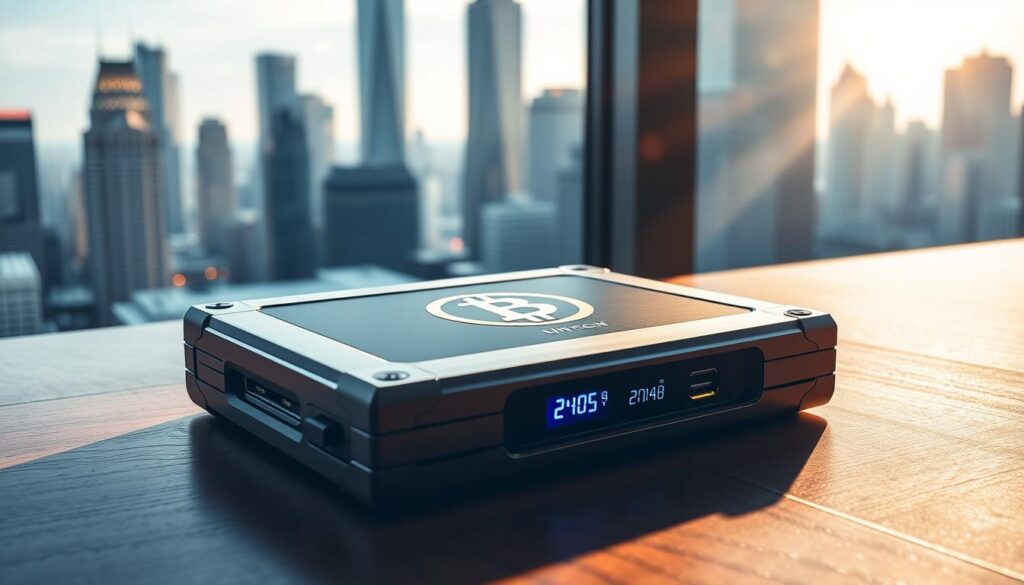Is Bitcoin Safe? Understanding Bitcoin Security and Risks
In 2022, hackers stole $3.8 billion worth of cryptocurrency, the worst year on record. This raises big questions about bitcoin’s safety and security. As Bitcoin’s value swung wildly, from nearly $48,000 to around $16,000, people are worried about their investments.
Bitcoin’s safety involves many areas, like cryptography, wallet security, and transaction safety. The SHA-256 algorithm makes it hard to reverse-engineer transactions, adding security. But, hacks like the Mt. Gox one in 2014 show that exchanges can be vulnerable, not just Bitcoin itself.
As more companies like Microsoft and Overstock start accepting Bitcoin, knowing about its security is more important than ever. Being aware of scams and using multi-signature setups can help keep your Bitcoin safe. These steps are key to ensuring the safety of Bitcoin and other cryptocurrencies.
Key Takeaways
- Bitcoin’s security is a multifaceted topic that encompasses several key areas, including cryptography, wallet security, and transaction safety, all of which impact is bitcoin safe.
- The SHA-256 cryptographic algorithm used for securing Bitcoin transactions makes reverse-engineering computationally prohibitive, enriching bitcoin security and cryptocurrency safety.
- Security breaches like the Mt. Gox hack in 2014 resulted in massive financial losses, highlighting vulnerabilities in exchanges, not the Bitcoin protocol itself, and affecting the overall perception of bitcoin security.
- User awareness is critical in preventing phishing attacks and scams, and multi-signature setups can add an extra layer of security, contributing to the overall safety of bitcoin and cryptocurrency safety.
- Understanding bitcoin security and risks is essential for investors and users to make informed decisions about their investments and to determine is bitcoin safe.
- Bitcoin’s price volatility and transaction fees can also impact the overall safety and security of the bitcoin network, making it essential to consider these factors when evaluating bitcoin security and cryptocurrency safety.
- The use of cold wallets and multi-signature wallets can enhance the security of bitcoin storage and transactions, reducing the risk of theft and loss, and improving overall bitcoin security and cryptocurrency safety.
Understanding Bitcoin’s Core Security Features

Bitcoin’s core security features make it a safe and decentralized place for transactions. To see how secure Bitcoin is, we need to look at its main parts. The blockchain, a decentralized network, and proof-of-work all work together. They stop any one person from controlling the network, keeping transactions safe.
Bitcoin’s security comes from its use of cryptography and a decentralized network. The blockchain makes all transactions open and unchangeable. This makes it hard for hackers to mess with the network. So, Bitcoin is a solid choice for safe transactions.
The decentralized network and proof-of-work are key to keeping the network safe. The proof-of-work needs lots of computer power to check transactions. This stops one person from taking over the network. Together, these features create a strong security system. They protect Bitcoin users and keep the network safe for transactions.
Some important features of Bitcoin’s security include:
- Decentralized network architecture
- Proof-of-work consensus mechanism
- Blockchain technology
These features help make Bitcoin a secure place for transactions. They answer questions about Bitcoin’s security and show how to protect it.
Is Bitcoin Safe as a Digital Currency?

Bitcoin is a digital currency with many benefits. It offers fast and secure transactions, low fees, and is easy to access. But, it also has some risks of bitcoin, like price swings and security issues. To deal with these risks, using bitcoin security measures is key, including safe bitcoin wallet security practices.
Investors need to know about these risks and protect their money. This means using 2-factor authentication and keeping financial info private to dodge scammers. Also, storing Bitcoin in a cold wallet adds extra security.
Being careful of phishing scams is also important. Only invest what you can afford to lose. By being cautious and informed, investors can keep their Bitcoin safe and reduce the risks of bitcoin.
The Technology Behind Bitcoin Security

Bitcoin’s security comes from advanced cryptography. This includes public and private key encryption, digital signatures, and transaction verification. The decentralized Bitcoin network means an attack on one node doesn’t harm the whole network. To see how secure Bitcoin is, we must look at its security technology.
Cryptocurrency safety is key, and Bitcoin’s use of a write-only ledger is a big part of its trustworthiness. This ledger means transactions can’t be reversed or altered.
There are many ways to keep Bitcoin safe. Asymmetric key cryptography in off-chain transactions adds extra protection. Smart contracts on Layer 2 protocols like Stacks, RSK, and Lightning also boost security and speed. The Bitcoin blockchain uses Proof of Work (PoW) to ensure new transactions are approved, adding to its safety.
- Decentralized network architecture
- Public and private key encryption
- Digital signatures and transaction verification
- Network node security
These elements work together to keep transactions safe and private. This makes Bitcoin a secure digital currency. By understanding Bitcoin’s security technology, users can protect their investments and keep their cryptocurrency safe.
Common Security Threats to Bitcoin Users

Bitcoin users face many security threats like hacking, phishing, and malware. These threats can lead to big financial losses. The risks of bitcoin are many, and users need to know the dangers to keep their money safe. One big worry is the theft of private keys, which can let someone steal your bitcoin.
To fight these risks, using strong bitcoin security measures is key. This means using safe wallets, turning on two-factor authentication, and keeping software current. Also, be careful with unknown websites or people, as phishing scams can be very tricky.
Some common security threats to bitcoin users include:
- Hacking and theft of private keys
- Phishing and malware attacks
- Crypto-mining malware and ransomware threats
- Insider threats and sabotage
To make sure secure bitcoin transactions, users should focus on security. This means using trusted exchanges, checking transactions, and watching accounts for odd activity.
By knowing the security threats and taking steps to protect themselves, bitcoin users can lower the risks of bitcoin. This way, they can have a safe and secure experience.
Bitcoin Wallet Security Essentials

Bitcoin wallet security is key to keeping your investments safe. With more people using cryptocurrency, keeping transactions secure is more important than ever. Cryptocurrency safety relies on the wallet’s security. There are different types of wallets, like hot wallets and cold storage, each with its own security features.
Using hardware wallets is a top choice for security. They keep private keys offline, making them hard to hack. Trezor and Ledger are well-known for their security, with features like two-factor authentication and encryption.
Backup and recovery methods are also vital for wallet security. It’s important to back up your wallet and store it safely. Use secure methods like two-factor authentication to keep your wallet safe from unauthorized access.
Choosing a reputable wallet provider is also key for secure bitcoin transactions. Research the provider and read user reviews. Keep your wallet software updated and use strong passwords and two-factor authentication to stay safe.
Here are some benefits of using a secure bitcoin wallet:
- Protection against hacking and theft
- Secure storage of private keys
- Advanced security features like two-factor authentication and encryption
- Easy backup and recovery methods
Protecting Your Bitcoin Investment
To keep your bitcoin safe, it’s key to use good security measures. A mix of hot and cold wallets is a smart move. Cold wallets, or cold storage, are top for keeping Bitcoin safe. But, remember, losing a hardware wallet can mean losing your Bitcoin forever.
Using two-factor authentication (2FA) is another smart step. It can cut down unauthorized access by up to 90%. Keeping your software up to date is also vital. Old software can leave your Bitcoin at risk. Diversifying your crypto portfolio can also help, with a mix of Bitcoin, altcoins, and stablecoins.
When picking a Bitcoin wallet, look at its security and fee options. Cold storage wallets are best for long-term storage because they’re very secure. It’s also important to know about scams targeting Bitcoin investors, which have grown more common.
By taking these steps and staying informed, you can keep your bitcoin safe. Always put security first and choose reliable exchanges and wallets. They should have strong security and insurance against theft.
Bitcoin Network Vulnerabilities
Despite its strong security, the Bitcoin network faces vulnerabilities. Bitcoin security measures are always improving to fight threats. A big worry is the 51% attack risk, which could let a bad actor control most of the network.
To tackle these risks, it’s key to focus on secure bitcoin transactions and cryptocurrency safety. Using hardware wallets, enabling two-factor authentication, and moving crypto from exchanges to personal wallets are good steps.
Risks Associated with 51% Attacks
A 51% attack would need a bad actor to control over 50% of the network’s power. Though unlikely, it’s important to know the risks and take steps to stop such attacks.
Double Spending Concerns
Double spending is another risk, where someone could spend the same bitcoin twice. But, the Bitcoin network’s design and cryptocurrency safety features make this very unlikely.
By knowing these risks and using strong bitcoin security measures, users can keep their secure bitcoin transactions safe and sound.
Regulatory and Legal Security Considerations
When we talk about cryptocurrency safety, rules and laws are key. The U.S. government has made laws to help the crypto world. These laws, like the Responsible Financial Innovation Act (RFIA) and the Digital Commodities Consumer Protection Act (DCCPA), aim to protect investors.
To know if how secure is bitcoin, we need to look at the rules around it. The SEC says some tokens are like stocks. This means investors need to think about how to keep their bitcoin safe.
Some important rules to follow include:
- Following anti-money laundering and know-your-customer rules
- Keeping up with tax laws and reporting
- Knowing if digital assets are seen as stocks or commodities
Understanding these rules helps investors make smart choices in the crypto market. It’s important to keep up with new laws to protect cryptocurrency safety.
Best Practices for Secure Bitcoin Transactions
To keep your cryptocurrency safe, follow some key steps. This means verifying transactions, thinking about fees, and timing them right. These actions can greatly lower the chance of security issues and keep your money safe.
Verification is a big part of secure transactions. Make sure the recipient’s address is right and the transaction details are correct. Also, think about fee considerations to avoid extra costs and delays. Timing your transactions well is important too, considering network congestion and market changes.
- Using strong, unique passwords and enabling two-factor authentication
- Keeping software and wallets up to date with the latest security patches
- Using reputable and trustworthy wallet providers and exchanges
- Being cautious when using public Wi-Fi networks and avoiding phishing attempts
By following these best practices and being proactive with bitcoin security measures, you can protect your funds. This ensures the safety and integrity of your bitcoin transactions.
Market Risks and Price Volatility
Investing in bitcoin comes with big risks of bitcoin. Market risks and price volatility are major concerns. The value of bitcoin can change fast, leading to big losses if sold at the wrong time. Recent data shows bitcoin’s price dropped by about 7% in just one hour.
To reduce these risks, it’s key to take steps like diversifying your investments and using trusted exchanges. Also, keeping your investments safe means using secure wallets and keeping your login details private.
Investors should keep these points in mind:
- Financial advisors recommend a small crypto allocation of 1% to 2% in your portfolio.
- Experts say bitcoin shouldn’t be a main part of your retirement savings because of its ups and downs.
- A mix of stocks and bonds in your portfolio is better for steady growth in retirement.
Environmental and Sustainability Security Concerns
The world is now more aware of cryptocurrency safety. The big issue is Bitcoin mining’s environmental impact. It uses a lot of energy, raising concerns about its sustainability. As people ask more about how secure is bitcoin, we must think about its mining’s effects on the planet.
Bitcoin’s energy use is huge, about 144.16 TWh. That’s like a small country’s energy use. Its carbon footprint is as big as burning 84 billion pounds of coal or running 190 gas plants. To fix this, we’d need to plant 3.9 billion trees, covering an area almost as big as the Netherlands.
We need to find ways to protect both bitcoin and the environment. Some options, like Bitgreen, use 99.5% less electricity than traditional mining. Ethereum’s switch to Proof of Stake could cut energy use by 99.95%. By choosing greener methods, we can keep bitcoin safe and sustainable for the future.
Some important facts about Bitcoin mining’s environmental impact are:
- 86% of Americans know about cryptocurrencies
- 16% of Americans have used digital currencies
- Bitcoin’s energy use is about 144.16 TWh
- Its carbon footprint is like burning 84 billion pounds of coal
Future of Bitcoin Security
The future of bitcoin security is a big topic. As more people use it, keeping transactions safe is key. About 25% of Bitcoins could be at risk from quantum attacks, which could harm the whole network.
Experts say a quantum computer could break some security keys in hours or minutes. This shows we need strong security measures. The Bitcoin blockchain is designed to resist quantum attacks, but we must keep improving to stay safe.
To keep bitcoin safe, we should follow best practices. Use unique addresses for each transaction and update software regularly. By focusing on safety and staying updated, we can protect our investments and help keep the Bitcoin network secure.
Conclusion
Bitcoin’s security is complex and needs a full approach. Its core security, like blockchain and a decentralized network, is strong. But, users must also take steps to protect their money.
Following best practices for wallet security and checking transactions is key. Staying up-to-date with regulatory and market news helps too. This way, investors can lower the risks of using Bitcoin.
The future of Bitcoin security depends on developers and users working together. By fixing weaknesses and using strong security, cryptocurrency safety will improve. This will help Bitcoin grow and stay strong for the future.




